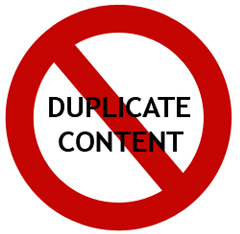 Recently after posting an expert level technical blog article, a client of Orion Group was approached by an industry authority website seeking to develop their own article based upon content featured in the original blog article. Our client recognized the invitation as being an opportunity for getting additional online exposure and gladly agreed.
Recently after posting an expert level technical blog article, a client of Orion Group was approached by an industry authority website seeking to develop their own article based upon content featured in the original blog article. Our client recognized the invitation as being an opportunity for getting additional online exposure and gladly agreed.
After the third-party authority website posted their discussion derived from the source blog article our client contacted Orion Group to promote the good press they had received. Their excitement was tempered when we checked the article for duplication, and found it to be almost 100 percent duplicated. We explained to our client that the well intended actions of the industry authority website was putting them at risk for lessened Google ranking.
Duplicate Content Can Confuse Search Engines
The action of the authority website’s repurposing of almost the entire block of content without adding their own original commentary, opinions or other supplementary information would likely be deemed duplicate content by search engines spidering both websites.
Without any concrete evidence of which site was the original source, search engines would likely look at other factors in an attempt to make arbitrary determination of which website has more authority.
With that determination could come the possibility of one website being excluded from keyword phrase ranking. Even if not outright excluded, the search engines may still list it with the possibility of one of the websites being wrongfully ranked higher than the other. Obviously, it would be a problem for our client if their website is the one losing Google ranking and visibility.
Employ Oversight Strategies To Avoid Duplicate Content
Thankfully there are ways to reduce the risk of this happening to our client or anyone in a similar circumstance. In the context of a scenario where you have been notified that your online content is is being considered for repurposing by a friendly online third party, the following oversight strategies should be employed:
- Communicate to the third party that there is a risk of your website’s organic ranking being negatively impacted if the content is copied and pasted upon the requesting website.
- Provide permission for use to the third party contingent upon content not being an exact word for word duplication.
- Seek editing and/or final approval privileges on the article prior to being posted online. This will provide you the opportunity to override blatant duplication of content.
If you find yourself in the circumstance that your content has already been appropriated without any intentional misdeed, another approach may be taken.
Request the third party website rework their duplicate content using the following strategies:
- Convert borrowed content into quotations, attributable to the appropriate subject matter expert within your organization.
- Rewrite sentences containing keyword phrases, or placement of keyword phrases into different sentences and locations within the blog article.
- Changing overall slant and/or format – Can the original content be re-spun into any of the following: case studies; interviews, either transcribed for print or video/audio; newspaper style articles employing the standard, who, what, when, where, why, and how story elements.
- In all instances add a link back to the original article citing it as the source.
DMCA Act and Google Anti-Piracy Policy Ensures Removal of Plagiarised Content
If duplicated content is outright plagiarised, scraped, or stolen you have other recourse. Contact the website and request the duplicated content be immediately removed. Legitimate websites will likely respond appropriately.
If your content is not removed you can then make a DMCA request. The Digital Millennium Copyright Act (DMCA) is a federal act that provides a mechanism for requesting removal of mis-purposed copyrighted materials found on other websites.
The act provides provisions for contacting Internet Service Providers (ISP) and requesting take down of content that infringes upon the holder of the copyrighted material. Per DCMA, the ISP must take down the infringing content.
Further protection is provided by Google’s Anti-Piracy policy. In accordance with DCMA, Google’s Anti-Piracy policy provides provision for removing Search Engine Results Page (SERP) links to web pages containing content protected under copyright law. Detailed information may be reviewed at:https://www.google.com/transparencyreport/removals/copyright/faq/ .
Proactive Approach Provides Many Benefits
Sharing content is an excellent strategy to increase visibility of your organization’s website, grow organic ranking and develop strategic alliances with other closely-aligned organizations.
By developing a proactive approach to administering and sharing content with members of your extended online community, you can greatly the risk of reduced Google ranking and have strategies in-place to counteract instances in which content is misappropriated by naivete or negligence.
